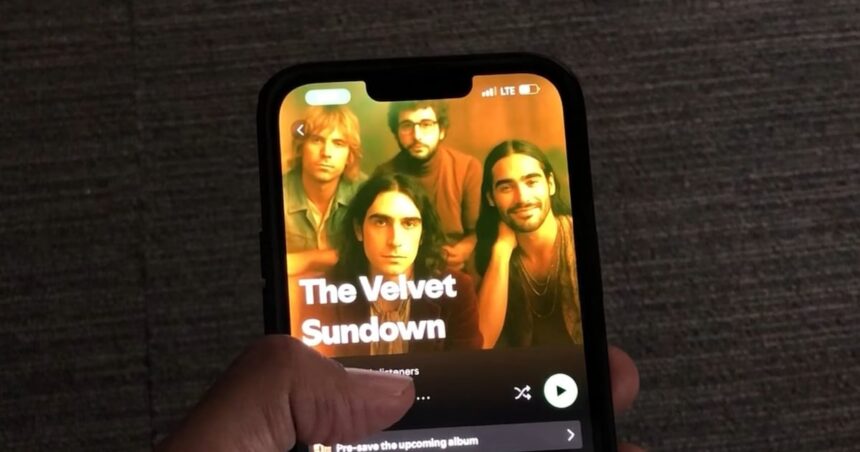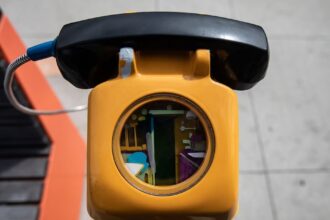The mysterious band that appeared out of nowhere six months ago has captivated millions with their haunting melodies and enigmatic persona. Velvet Sundown’s meteoric rise—accumulating over 500 million streams without a single interview, concert, or identifiable band member—has transformed from curiosity to controversy as evidence mounts that this musical sensation might be entirely AI-generated.
Their debut album “Whispers in the Static” features the kind of atmospheric rock that feels eerily familiar yet impossible to place. The vocals shift between tender vulnerability and raw power with a perfection that has industry veterans raising eyebrows. What initially seemed like strategic anonymity in an overshared digital age has evolved into something potentially more calculated—and divisive.
“The clues were there from the beginning,” explains music producer Elaine Winters. “The perfect vocal control across impossible ranges, the lack of breathing artifacts, and production quality that sounds simultaneously vintage and futuristic. We’re likely witnessing one of the most sophisticated AI music projects ever released into the mainstream without disclosure.”
The controversy deepened last week when audio engineer Marcel Thompson published a detailed analysis highlighting what he calls “algorithmic patterns” in Velvet Sundown’s compositions. “There’s a mathematical precision to how they build tension and release that mimics human creativity but follows predictable formulas once you know what to look for,” Thompson noted in his widely-shared report.
Music streaming platforms find themselves in unprecedented territory. While AI-assisted music creation has existed for years, Velvet Sundown represents something altogether different: potentially the first AI-generated artist to achieve mainstream success while presenting as human. Spotify and Apple Music have maintained that their agreements with Velvet Sundown’s label, Horizon Records, included standard human artist verification processes.
The implications stretch far beyond this single case. If Velvet Sundown is indeed AI-created, the success challenges fundamental assumptions about artistic authenticity and human connection. The band’s devoted fanbase—many of whom have described profound emotional responses to songs like “Afterglow Memories” and “Satellite Hearts”—would be forced to reckon with falling in love with music that came from code rather than lived experience.
“We’re entering philosophical territory here,” says Dr. Sofia Chen, digital ethics researcher at McGill University. “If music moves you to tears, does it matter whether those emotions were crafted by human hands or algorithms trained on human creativity? The answer isn’t simple, but the disclosure certainly matters.”
Horizon Records has neither confirmed nor denied the allegations, releasing only a cryptic statement: “Velvet Sundown’s artistry speaks for itself. The connection their music creates with listeners is genuine, regardless of the creative process behind it.”
Musicians’ rights organizations have called for transparency and new industry standards. “Artists spend lifetimes developing their craft,” says Jean-Michel Benoit, spokesperson for the Canadian Musicians Coalition. “If AI can replicate that overnight, we need clear labeling and differentiation to protect human artistry while allowing technological innovation to flourish.”
The controversy coincides with proposed legislation in several countries regarding AI transparency in creative works. The European Union’s forthcoming Digital Creation Act would require disclosure of AI involvement in commercially released creative content, while similar measures are being debated in Canada and the United States.
Despite—or perhaps because of—the controversy, Velvet Sundown’s popularity continues to surge. Their latest single “Digital Heartbeats” climbed to #2 on global charts this week, its lyrics hauntingly appropriate: “Can you feel what I feel / Through the wires and the steel / Is this connection something real?”
The question resonates beyond music into our increasingly AI-integrated world. As the lines between human and artificial creativity blur, the Velvet Sundown phenomenon forces us to confront uncomfortable questions: In an age where algorithms can create beauty that moves us, what defines authentic artistic expression? And if we can’t tell the difference, does it matter?
For more on evolving cultural trends, visit CO24 Culture or explore more opinion pieces on technology and society at CO24 Opinions.










